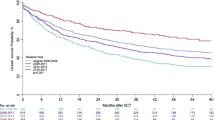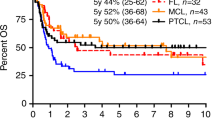Abstract
Allogeneic stem cell transplant (alloSCT) is a current treatment option for patients with refractory/relapsed classic Hodgkin lymphoma (CHL), including those who have failed an autologous transplantation. We performed a retrospective multicenter analysis of 113 patients (median age 28 years; range 14–56; 54% males) with refractory/relapsed (R/R) CHL who had undergone alloSCT in Argentina. Kaplan–Meier was used to estimate overall (OS) and progression-free survival (PFS). Relapse rate (RR) and non-relapse mortality (NRM) were estimated with cumulative incidence analysis. Disease status at transplant was complete remission (CR) in 39%, partial remission (PR) in 44%, and stable/progressed disease (S/PD) in 17% of the patients. Donor type was matched related (MRD) in 60%, unrelated (URD) in 19%, and haploidentical (HID) in 21% of the patients. OS and PFS at 2 years were 43% and 27%, respectively, for all the cohort. In the univariate analysis, patients in CR showed better OS (p ≤ 0.001) and PFS (p ≤ 0.001), and lower NRM (p = 0.04). HID had better PFS (p = 0.04) and lower RR (p = 0.02). In the multivariate analysis, CR showed a significant impact on OS and PFS, and HID on PFS. AlloSCT is a feasible procedure in patients with CHL. Those in CR at the time of the transplant had better outcomes. Haploidentical transplantation is associated with better PFS in these patients with poor prognosis.
This is a preview of subscription content, access via your institution
Access options
Subscribe to this journal
Receive 12 print issues and online access
$259.00 per year
only $21.58 per issue
Buy this article
- Purchase on Springer Link
- Instant access to full article PDF
Prices may be subject to local taxes which are calculated during checkout





Similar content being viewed by others
References
Ansell SM. Hodgkin lymphoma: 2014 update on diagnosis, risk-stratification, and management. Am J Hematol. 2014;89:771–9.
Linch DC, Winfield D, Goldstone AH, Moir D, Hancock B, McMillan A, et al. Dose intensification with autologous bone-marrow transplantation in relapsed and resistant Hodgkin’s disease: results of a BNLI randomized trial. Lancet. 1993;341:1051–4.
Duarte RF, Labopin M, Bader P et al. Indications for haematopoietic stem cell transplantation for haematological diseases, solid tumours and immune disorders: current practice in Europe, 2019. Bone Marrow Transplant. 2019. https://doi.org/10.1038/s41409-019-0516-2.
Younes A, Bartlett NL, Leonard JP, Kennedy DA, Lynch CM, Sievers EL, et al. Brentuximab vedotin (SGN-35) for relapsed CD30-positive lymphomas. N Engl J Med. 2010;363(Nov):1812–21.
Younes A, Santoro A, Engert A, Zinzani PL, Timmerman JM, Ansell S, et al. Nivolumab for classical Hodgkin’s lymphoma after failure of both autologous stem-cell transplantation and brentuximab vedotin: a multicentre, multicohort, single-arm phase 2 trial. Lancet Oncol. 2016;17:1283–94.
Armand P, Shipp MA, Moskowitz CH, Michot JM, ZinzaniPL, Kuruvilla J, et al. Programmed death-1 blockade with pembrolizumab in patients with classical hodgkin lymphoma after brentuximab vedotin failure. J Clin Oncol. 2016;34:3733–9.
Collins GP, Pocock C, Peggs KS, Kayani I, Sureda A, Illidge T, et al. Guideline on the management of primary resistant and relapsed classical Hodgkin lymphoma. Br J Haematol. 2014;164:39–52.
Moskowitz CH. Should all patients with HL who relapse after ASCT be considered for allogeneic SCT? A consult, yes; a transplant, not necessarily. Blood Adv. 2018;10:821–4.
Peggs KS. Should all patients with Hodgkin lymphoma who relapse after autologous SCT be considered for allogeneic SCT? Blood Adv. 2018;2:817–20.
Sureda A, Canals C, Arranz R, Caballero D, Ribera JM, Brune M, et al. Allogeneic stem cell transplantation after reduced intensity conditioning in patients with relapsed or refractory Hodgkin’s lymphoma. Results of the HDR-ALLO study—a prospective clinical trial by the Grupo Español de Linfomas/ Trasplante de Médula Osea (GEL/TAMO) and the Lymphoma Working Party of the European Group for Blood and Marrow Transplantation. Haematologica. 2012;97:310–7.
Akpek G, Ambinder RF, Piantadosi S, Abrams RA, Brodsky RA, Vogelsang GB, et al. Long-term results of blood and marrow transplantation for Hodgkin’s lymphoma. J Clin Oncol. 2001;19:4314–21.
Peggs KS, Hunter A, Chopra R, Parker A, Mahendra P, Milligan D, et al. Clinical evidence of a graft-versus-Hodgkin’s- lymphoma effect after reduced-intensity allogeneic transplantation. Lancet. 2005;365:1934–41.
Burroughs LM, O’Donnell PV, Sandmaier BM, Storer BE, Luznik L, Symons HJ, et al. Comparison of outcomes of HLA-matched related, unrelated, or HLA-haploidentical related hematopoietic cell transplantation following nonmyeloablative conditioning for relapsed or refractory Hodgkin lymphoma. Biol Blood Marrow Transpl. 2008;14:1279–87.
Peggs KS, Kayani I, Edwards N, Kottaridis P, Goldstone AH, Linch DC, et al. Donor lymphocyte infusions modulate relapse risk in mixed chimeras and induce durable salvage in relapsed patients after T-cell-depleted allogeneic transplantation for Hodgkin’s lymphoma. J Clin Oncol. 2011;29:971–8.
Greaves PJ, Gribben JG. Demonstration of durable graft versus lymphoma effects in Hodgkin’s lymphoma. J Clin Oncol. 2011;29:952.
Raiola A, Dominietto A, Ghiso A, Di Grazia C, Lamparelli T, Gualandi F, et al. Unmanipulated haploidentical bone marrow transplantation and posttransplantion cyclophosphamide for hematologic malignancies after myeloablative conditioning. Biol Blood Marrow Transplant. 2013;19:117–22.
Raiola A, Dominietto A, Bramanti S, Ghiso A, Galaverna F, Bramanti S, et al. Unmanipulated haploidentical BMT following non-myeloablative conditioning and post-transplantation CY for advanced Hodgkin’s lymphoma. Bone Marrow Transpl. 2014;49:190–4.
Messer M, Steinzen A, Vervölgyi E, Lerch C, Richter B, Dreger P, et al. Unrelated and alternative donor allogeneic stem cell transplant in patients with relapsed or refractory Hodgkin lymphoma: a systematic review. Leuk Lymphoma. 2014;55:296–306.
Luznik L, Jalla S, Engstrom LW, Iannone R, Fuchs EJ, et al. Durable engraftment of major histocompatibility complex-incompatible cells after nonmyeloablative conditioning with fludarabine, low-dose total body irradiation, and posttransplantation cyclophosphamide. Blood. 2001;98:3456–64.
Pitombeira de Lacerda M, Arrais Rodrigues C, Pereira AD, Novis Y, Fonseca M, Rocha V, et al. Hla-Haploidentical transplantation for relapsed/refractory hodgkin lymphoma: a multicenter analysis. Biol Blood Marrow Transpl. 2017;23:705–70.
Gajewski JL, Phillips GL, Sobocinski KA, Armitage JO, Gale RP, Champlin RE, et al. Bone marrow transplants from HLA-identical siblings in advanced Hodgkin’s disease. J Clin Oncol. 1996;14:572–8.
Milpied N, Fielding AK, Pearce RM, Ernst P, Goldstone AH. Allogeneic bone marrow transplant is not better than autologous transplant for patient with relapsed Hodgkin’s disease. European Group for Blood and Bone Marrow Transplantation. J Clin Oncol. 1996;14:1291–6.
Sureda A, Robinson S, Canals C, Carella AM, Boogaerts MA, Caballero D, et al. Reduced-intensity conditioning compared with conventional allogeneic stem-cell transplantation in relapsed or refractory Hodgkin lymphoma: an analysis from the lymphoma working party of the European Group for Blood and Marrow Transplantation. J Clin Oncol. 2008;26:455–62.
Genadieva-Stavrik S, Boumendil A, Dreger P, Peggs K, Briones J, Corradini P, et al. Myeloablative versus reduced intensity allogeneic stem cell transplantation for relapsed/refractory Hodgkin’s lymphoma in recent years: a retrospective analysis of the Lymphoma Working Party of the European Group for Blood and Marrow Transplantation. Ann Oncol. 2016;27:2251–7.
Cheson BD, Pfistner B, Juweid ME, Gascoyne RD, Specht L, Horning SJ, et al. Revised response criteria for malignant lymphoma. J Clin Oncol. 2007;25:579–86.
Bacigalupo A, Ballen K, Rizzo D, Giralt S, Lazarus H, Ho V, et al. Defining the intensity of conditioning regimens: working definitions. Biol Blood Marrow Transpl. 2009;15:1628–33.
Kuruvilla J, Keating A, Crump M. How I treat relapsed and refractory Hodgkin lymphoma. Blood. 2011;117:4208–17.
Hertzberg. Mark. Relapsed/refractory Hodgkin lymphoma what is the best salvage therapy and do we need RIC-AlloSCT? Hematol Oncol Clin N Am. 2014;28:123–47.
Corradini P. Allogeneic transplantation for Hodgkin’s lymphoma. Br J Haematol. 2011;152:261–72.
Van Den Neste E, Casasnovas O, André M, Touati M, Senecal D, Edeline V, et al. Classical Hodgkin’s lymphoma: the Lymphoma Study Association guidelines for relapsed and refractory adult patients eligible for transplant. Haematologica. 2013;98:1185–95.
Perales MA, Cebeiro I, Carpenter PA, Burns LJ, Chen R, Cole PD, et al. Role of cytotoxic therapy with hematopoietic cell transplantation in the treatment of Hodgkin lymphoma: guidelines from the American Society for Blood and Marrow Transplantation. Biol Blood Marrow Transpl. 2015;21:971–83.
Hope R, Advani R, et al. NCCN. National Comprehensive Cancer Network clinical guidelines on oncology. Hodgkin lymphoma. (v2.2019). https://www.nccn.org/professionals/physician_gls/pdf/hodgkins.pdf.
Younes A, Gopal AK, Smith SE, Ansell SM, Rosenblatt JD, Chen R, et al. Results of a pivotal phase II study of brentuximab vedotin for patients with relapsed or refractory Hodgkin’s lymphoma. J Clin Oncol. 2012;30:2183–9.
Garciaz S, Coso D, Peyrade F, Fürst S, Duran S, Chetaille B, et al. Brentuximab vedotin followed by allogeneic transplantation as salvage regimen in patients with relapsed and/or refractory Hodgkin lymphoma. Hematol Oncol. 2014;32:187–91.
Illidge T, Bouabdallah R, Chen R, Gopal AK, Moskowitz, Ramchandren R, et al. Allegeneic transplant following Brentuximab Vedotin in patients with relapsed or refractory Hodgkin lymphoma and systemic anaplastic Large cell. Leuk Lymphoma. 2014;10:1–34.
Robinson SP, Sureda A, Canals C, Russell N, Caballero D, Bacigalupo A, et al. Reduced intensity conditioning allogeneic stem cell transplantation for Hodgkin’s lymphoma: identification of prognostic factors predicting outcome. Haematologica. 2009;94:230–8.
Marcais A, Porcher R, Robin M, Mohty M, Michalet M, Blaise D, et al. Impact of disease status and stem cell source on the results of reduced intensity conditioning transplant for Hodgkin’s lymphoma: a retrospective study from the French Society of Bone Marrow Transplantation and Cellular Therapy (SFGM-TC). Haematologica. 2013;98:1467–75.
Anderlini P, Saliba R, Acholonu S, Giralt SA, Andersson B, Ueno NT, et al. Fludarabine-melphalan as a preparative regimen for reduced-intensity conditioning allogeneic stem cell transplantation in relapsed and refractory Hodgkin’s lymphoma: the updated M.D. Anderson Cancer Center experience. Haematologica. 2008;93:257–64.
Chen R, Gopal A, Younes A, Ansell SM, Rosenblatt JD, Savage KJ, et al. Five-year survival and durability results of brentuximab vedotin in patients with relapsed or refractory Hodgkin lymphoma. Blood. 2016;128:1562–6.
Chen R, Palmer JM, Tsai NC, Thomas S, Paris T, Popplewell L, et al. Brentuximab vedotin is associated with improved progression-free survival after allogeneic transplantation for Hodgkin lymphoma. Biol Blood Marrow Transpl. 2014;20:1864–8.
Herbaux C, Gauthier J, Brice P, Drumez E, Ysebaert L, Doyen H, et al. Efficacy and tolerability of nivolumab after allogeneic transplantation for relapsed Hodgkin lymphoma. Blood. 2017;129:2471–8.
Ijaz A, Khan A, Malik S, et al. Significant risk of graft-versus-host disease with exposure to checkpoint inhibitors before and after allogeneic transplantation. Biol Blood Marrow Transpl. 2019;25(Jan):94–9.
Marrioti J, Devillier R, Bramanti S, et al. T cell-replete haploidentical transplantation with post-transplantation cyclophosphamide for Hodgkin lymphoma relapsed after autologous transplantation: reduced incidence of relapse and of chronic graft-versus-host disease compared with HLA-identical related donors. Biol Blood Marrow Transpl. 2018;24:627–32.
Gauthier J, Poiré X, Gac AC, et al. Better outcome with haploidentical over HLA-matched related donors in patients with Hodgkin’s lymphoma undergoing allogeneic haematopoietic cell transplantation-a study by the Francophone Society of Bone Marrow Transplantation and Cellular Therapy. Bone Marrow Transpl. 2018;53:400–9.
Martinez C, Gayoso J, Canals C. et al. Post-transplantation cyclophosphamide-based haploidentical transplantation as alternative to matched sibling or unrelated donor transplantation for Hodgkin lymphoma: a registry study of the Lymphoma Working Party of the European Society for Blood and Marrow Transplantation. J Clin Oncol. 2017;35:3425–32.
Ahmed S, Kanakry J, Ahn K, et al. Lower GVHD and relapse risk in PTCy-based haploidentical vs matched sibling donor RIC transplant for Hodgkin lymphoma. Biology of Blood and Marrow Transplantation. 2019. https://doi.org/10.1016/j.bbmt. 2019. 05.025.
Author information
Authors and Affiliations
Consortia
Corresponding author
Ethics declarations
Conflict of interest
The authors declare that they have no conflict of interest.
Additional information
Publisher’s note: Springer Nature remains neutral with regard to jurisdictional claims in published maps and institutional affiliations.
Rights and permissions
About this article
Cite this article
Rivas, M.M., Berro, M., Prates, M.V. et al. Allogeneic stem cell transplantation improves survival in relapsed Hodgkin lymphoma patients achieving complete remission after salvage treatment. Bone Marrow Transplant 55, 117–125 (2020). https://doi.org/10.1038/s41409-019-0640-z
Received:
Revised:
Accepted:
Published:
Issue Date:
DOI: https://doi.org/10.1038/s41409-019-0640-z
This article is cited by
-
Use of checkpoint inhibitors in patients with lymphoid malignancies receiving allogeneic cell transplantation: a review
Bone Marrow Transplantation (2021)
-
Is this real life? Is this just fantasy? Decreased relapse following haploidentical transplant in Hodgkin’s lymphoma with posttransplant cyclophosphamide
Bone Marrow Transplantation (2020)
-
Outcome after autologous stem cell transplantation in primary refractory or relapsed Hodgkin lymphoma—a long-term follow-up single center experience
Annals of Hematology (2020)



